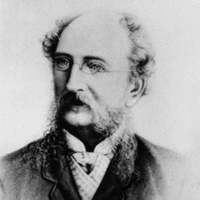Progress in the Pacific
Lapp’d in blue Pacific waters lies an isle of green and gold,
A garden of enchantment such as Eden was of old;
And the innocent inhabitants, pure children of the sun,
Resembled those of Eden, too—in more respects than one.
But included in its list of charms this peaceful isle possessed
A feature that seemed rather out of keeping with the rest;
A huge volcano frowned above palm-grove and taropatch
That ev’n for Krakatoa might have proved an equal match.
“Might have proved,” I say advisèdly,—for ages now had past
Since this passion-worn volcano in a fit had breathed its last;
Now flowery vegetation draped its shoulders like a shawl—
Only the sullen cone stood unapparelled over all.
To this happy bower of innocence, this Island of the Blest,
Came two Melbourne Presbyterians—no matter on what quest—
Leading men in Church and Market, always found within the ring,
John McTaggart, William Wallace, Agents for—for everything.
How glowed their weary hearts before the beauty of the scene,
The palm-groves, the acacia-groves, and all the varied green!
How swelled their souls with sentiment when, swarming from their huts,
Oame the simple natives wooing them with pigs and cocoa-nuts!
“Eh, man, but this is sweet!” said John, and wiped away a tear.
“It is good for us (I say with the apostle) to be here.
The islands are God’s handiwork, their beauties are His own—
And, Weelyum—man, there should be lots of sulphur in that cone!
“These natives are a guileless folk, as we can well discern,
But how to make gunpowder is a thing they yet may learn.
Now, gunpowder leads to homicides, and other sinful scenes,
And I feel it is our duty to deprive them of the means.
“So lest some flagitious traders should come fossicking about,
This very day we’ll purchase that volcano out and out.
Lest guilt should stain these blameless souls we’ll form a Sulphur Co.”—
And, William, though a silent man, replied to him, “Juist so.”
Then they summoned their interpreter and made their wishes known,
And before the day was over that volcano was their own,
And the chiefs were paid the price in costly axes, hooks and knives,
While invaluable necklaces were showered upon their wives.
But not before McTaggart had impressed the native mind
With a solemn deed of transfer of a strictly legal kind,
Which Scripture, fraught, as was supposed, with threats and terrors dark,
Was attested by the signature of “Na-Galoo, His Mark.”
Then home they sailed, nor thought again for many and many a day
Of their potential riches in that island far away:
They had other fish to fry and other irons in the fire,
And success upon success but seemed to multiply desire.
But at length there came a season when their wealth developed wings,
And their hearts grew sad within them at the general look of things,
But most of all they sorrowed at the worldliness and pride
Of the smarter men who bested them and hustled them aside.
Said McTaggart, “Let us quit this sordid sphere, and for a while
Let us bathe our souls in innocence in yon sequestered isle;
The aims of men are vanity; life’s but a fleeting show—
And the Argus says that sulphur’s up.”—And William said “Juist so.”
So they raised, and raised with credit, all the necessary plant,
Nor forgot amid their haste that solemn league and covenant;
And thus and thus it came to pass ere many days had fled
That the island lay before them, and the grey cone towered o’erhead.
But where—where were the simple folk that greeted them of yore
And who were these red-shirted swells that met them on the shore,
And covered them with muskets of a fashion obsolete,
But possibly still lethal if discharged at twenty feet?
Alas, too soon they gathered from their semi-English speech
That the sixty three Kanaka bucks who blocked them on the beach
Were time-expired “Returns,” enlightened men, who not in vain
Had spent the intervening years in Queensland trashing cane.
“You come take solfa,” cried a Chief, who recognised the two,
“Flenchman Comp’ny buy him solfa. Solfa no belonga you
We sell him Comp’ny thing man call in Queensland mineral lease”—
And sixty-three Kanaka smiles broke up the evening peace.
Then McTaggart, white with godly ire, yet calm in sense of right,
Drew forth the sacred covenant and spread it to the light,—
“I bought your hill entire,” he said; “the whole volcano’s mine!”
But the Chieftain took the document and read it line by line
Read it word by word and line by line, date, signature and all,
As one who fain would do the right although the heaven’s should fall,
Then delivered this decision, “Hill belonga you all right.
But paper no say solfa. Flenchman buy him that. Goo’ night.”
* * * * *
“Is this the land,” McTaggart cried, “where we had fondly thought
To bathe our souls in innocence and bag what we had bought!
Sawtan hath made this isle his own! Arise and let us go.
Weelyum, Progress is a curse! a curse!” And William said “Juist so.”

